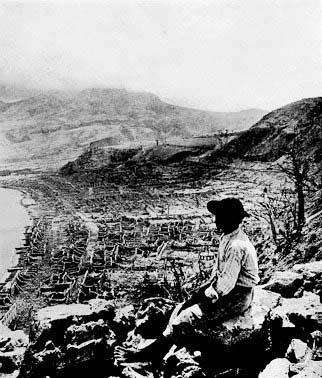Politically sensitive 'Made in Israel' wine-labelling case sent back to food agency
TORONTO — A finding that wine from the West Bank can be labelled as a product of Israel was not reasoned properly and should now be thrashed out again, the Federal Court of Appeal has ruled.

TORONTO — A finding that wine from the West Bank can be labelled as a product of Israel was not reasoned properly and should now be thrashed out again, the Federal Court of Appeal has ruled.

© Provided by The Canadian Press
As a result, the appellate court said the politically sensitive case, which at one point threatened to put Middle East politics on trial, should go back to the Complaints and Appeals Office of the Canadian Food Inspection Agency.
"The administrative decision maker must demonstrate that its interpretation of the relevant provisions is consistent with their text, context and purpose," Chief Justice Marc Noel said. "Here this demonstration is totally lacking."
The case arose in 2017, when Dr. David Kattenburg, of Winnipeg, raised concerns that wines produced by Psagot and Shiloh Winery, located in the West Bank, were from Israeli settlements in the occupied territories, not Israel itself. He argued the wines should not, under Canadian law, be branded as Product of Israel.
The Canadian Food Inspection Agency initially sided with him. However, the agency reversed course after some Jewish groups protested and Global Affairs Canada said the West Bank could be considered Israeli territory under the Canada-Israel free trade agreement.
In July 2019, a Federal Court judge found the settlements were not part of the State of Israel and the labelling was therefore misleading and deceptive. She sent the case back to the food inspection agency, saying Canadian consumers needed to know exactly what they were buying.
"One peaceful way in which people can express their political views is through their purchasing decisions," then-judge Anne Mactavish wrote, prompting the federal government to appeal.
In its analysis, the Federal Court of Appeal said the food agency was required to interpret and apply Canadian laws to decide whether the wine labels were indeed false or misleading.
The view of Global Affairs that the West Bank falls under the Canada-Israel Free Trade Agreement played a "determinative role" in the food agency's decision that the labelling was legal, Noel said. However, that was not enough to decide whether the agency's ruling had been reasonable, he said.
"We simply have no idea how the agency construed its legislation in coming to the conclusion that the labels are compliant," Noel said.
Noel said the agency, in taking a fresh look at the case, will want to hear from the affected parties, including Psagot, which had been unaware of the case until it reached Federal Court.
Noel also made it clear the agency is not bound by Mactavish's reasons.
"It will be open to the agency, as the decider of the merits of the labelling issue, to come to whatever outcome it thinks appropriate, provided that its interpretation and application of the relevant provisions to the facts in issue can be seen to be reasonable," Noel said.
Psagot bills itself as an award-winning winery 15 minutes north of Jerusalem. It says its wines are produced by Israelis under auspices of an Israeli company in an Israeli community subject to Israeli law in Israeli territory.
"Put simply, Psagot Winery proudly produces wines that are products of Israel," it says.
The winery said it was pleased the Federal Court of Appeal had now sent the case back to the food agency with direction the lower court's decision was not binding, and that Psagot can make submissions.
Dimitri Lascaris, the lawyer who acted for Kattenburg, said the government had again failed to persuade the court that the food agency had acted reasonably. The agency will not succeed in justifying its decision, he said.
"The reason for this is simple: As Canada’s government has long acknowledged, the West Bank is not part of Israel," Lascaris said. "The settlements in which these wines produced are, in the words of the U.N. Security Council, a 'flagrant violation of international law'."
Some Jewish groups called the ruling a victory, with the Centre for Israel and Jewish Affairs saying the case was "part of a broader campaign to boycott Israel and Israeli goods."
Michael Bueckert, vice-president of Canadians for Justice and Peace in the Middle East, said the organization was disappointed.
"There's no question that it is both false and misleading to apply "Product of Israel" labels to goods from illegal settlements in the occupied West Bank," Bueckert said.
This report by The Canadian Press was first published May 6, 2021.
As a result, the appellate court said the politically sensitive case, which at one point threatened to put Middle East politics on trial, should go back to the Complaints and Appeals Office of the Canadian Food Inspection Agency.
"The administrative decision maker must demonstrate that its interpretation of the relevant provisions is consistent with their text, context and purpose," Chief Justice Marc Noel said. "Here this demonstration is totally lacking."
The case arose in 2017, when Dr. David Kattenburg, of Winnipeg, raised concerns that wines produced by Psagot and Shiloh Winery, located in the West Bank, were from Israeli settlements in the occupied territories, not Israel itself. He argued the wines should not, under Canadian law, be branded as Product of Israel.
The Canadian Food Inspection Agency initially sided with him. However, the agency reversed course after some Jewish groups protested and Global Affairs Canada said the West Bank could be considered Israeli territory under the Canada-Israel free trade agreement.
In July 2019, a Federal Court judge found the settlements were not part of the State of Israel and the labelling was therefore misleading and deceptive. She sent the case back to the food inspection agency, saying Canadian consumers needed to know exactly what they were buying.
"One peaceful way in which people can express their political views is through their purchasing decisions," then-judge Anne Mactavish wrote, prompting the federal government to appeal.
In its analysis, the Federal Court of Appeal said the food agency was required to interpret and apply Canadian laws to decide whether the wine labels were indeed false or misleading.
The view of Global Affairs that the West Bank falls under the Canada-Israel Free Trade Agreement played a "determinative role" in the food agency's decision that the labelling was legal, Noel said. However, that was not enough to decide whether the agency's ruling had been reasonable, he said.
"We simply have no idea how the agency construed its legislation in coming to the conclusion that the labels are compliant," Noel said.
Noel said the agency, in taking a fresh look at the case, will want to hear from the affected parties, including Psagot, which had been unaware of the case until it reached Federal Court.
Noel also made it clear the agency is not bound by Mactavish's reasons.
"It will be open to the agency, as the decider of the merits of the labelling issue, to come to whatever outcome it thinks appropriate, provided that its interpretation and application of the relevant provisions to the facts in issue can be seen to be reasonable," Noel said.
Psagot bills itself as an award-winning winery 15 minutes north of Jerusalem. It says its wines are produced by Israelis under auspices of an Israeli company in an Israeli community subject to Israeli law in Israeli territory.
"Put simply, Psagot Winery proudly produces wines that are products of Israel," it says.
The winery said it was pleased the Federal Court of Appeal had now sent the case back to the food agency with direction the lower court's decision was not binding, and that Psagot can make submissions.
Dimitri Lascaris, the lawyer who acted for Kattenburg, said the government had again failed to persuade the court that the food agency had acted reasonably. The agency will not succeed in justifying its decision, he said.
"The reason for this is simple: As Canada’s government has long acknowledged, the West Bank is not part of Israel," Lascaris said. "The settlements in which these wines produced are, in the words of the U.N. Security Council, a 'flagrant violation of international law'."
Some Jewish groups called the ruling a victory, with the Centre for Israel and Jewish Affairs saying the case was "part of a broader campaign to boycott Israel and Israeli goods."
Michael Bueckert, vice-president of Canadians for Justice and Peace in the Middle East, said the organization was disappointed.
"There's no question that it is both false and misleading to apply "Product of Israel" labels to goods from illegal settlements in the occupied West Bank," Bueckert said.
This report by The Canadian Press was first published May 6, 2021.







 ©
©














